#( my english is not that great folks )
Explore tagged Tumblr posts
Text
I understand that literature nerd Jason Todd is kind of overblown in fanon compared to it's actual presence in canon (a few issues during his pre (and post?)crisis Robin tenure that highlight it) BUT consider that I think it's hilarious if the unhinged gun toting criminal has strong opinions on poetry
#ramblings of a lunatic#dc comics#Jason Todd#batfamily#it's just a fun quirk! it's a fun lil detail and I simply cannot slight ppl for enjoying and incorporating it into works#like obviously jason isn't the only one. I'm a big believer in the batfam having over lapping interests they refuse to bond over#i know dick canonically used the robin hood stories (which are pretty flowery in their language far as i can tell) as inspo for Robin#and i know babs was a librarian and even tho her area of nerddom is characterized as more computery she probably knows quite a lot-#-about literature as well#duke is a hobbyist writer i believe? i saw a fan mention that- which if so is great and I hope he's also a nerd#(i mean he is canonically. i remember him being a puzzle nerd in his introduction. but i mean specifically a lit nerd)#damian called Shakespeare boring but also took acting classes so i think he's more of a theatre kid.#Tim's a dropout and i don't think he's ever shown distinct interest in english lit and i can't remember for Steph?#I'm ngl my brain hyperfocused on musician Steph i forget some of her other interests I'm sorry (minus softball and gymnastics!)#and then Cass had her whole (non linear but it's whatevs) arc about literacy and learning to read#went from struggling to read in batgirl 00 to memorizing Shakespeare in 'tec and is now an avid read in batgirls!#she's shown reading edgar allen poe but we don't know if it's his short stories or his poems#point to all of the above being: i know Jason's not the only lit nerd in the batfam#but also i do need him to be writing poetry in his spare time and reading and reviewing it#jason at the next dead robins society meeting: evening folks today I'll be assigning all of us poems based on laika the space dog#damian and steph who have been kidnapped and brought to jasons warehouse to hangout: LET US GO BITCH#speaking of^ random poem i think jason would like: space dog by alan shapiro#wake up one morning in an unfamiliar more mature body with a profound sense of abandonment. the last four lines. mmm tasty
538 notes
·
View notes
Text
I combined footage from my Detektiv Conan Blu-ray with audio from my Case Closed FUNimation DVD and made an HD English dub clip compilation for Episodes 57-58, "The Holmes Freak Murder Case."
#detective conan#case closed#video#funimation english dub script#i wasn't actually gonna post this video to tumblr because it's so long (because i have a lot of feelings about this case!)#but folks on discord liked it and i'm all about my funi dub propaganda so why not right?#the dub script here is just so fun--and does so well at making the dialogue *work* and sound natural in english#and has so much flavor! it does arguably too much in terms of creative liberties but things like#'can i really trust what a kid saw?' of the sub translation compared to 'and what were you smoking before you ran out there?' in the dub#are much more enjoyable to me#(other fun phrasings: 'the one who's always hangin' around you guys' (sub) vs. 'the little-bitty one with the great big brain!' (dub))#(and 'of course not! the reason i applied for this tour was 'cuz i thought i might find kudo' (sub))#(vs. 'who me? no no no. actually i signed up because i was hoping to run into jimmy here. but i guess i'm out of luck' (dub))#(and so many more! this script just has so much character)#and while it is a shame that the dub eliminated heiji's accent i do like the changed line ('i know it's you!')#'cause you've met shinichi *once* heiji lol#but yeah this is a fun case! i'm really happy to have finally hd'd the funi dub for it :')#one of my favorite things about the funi dub is that jerry jewell (shinichi's va) voices conan's thoughts#and it's so nice to hear *shinichi* and heiji deducting together (and the way they finish each other's thoughts and vibe... it gets to me)
347 notes
·
View notes
Text
I said in the tags of my recent screencaps of Nick and Daisy dancing, "do you ever think. that all daisy really needed was a friend?" and apparently those tags resonated with more people than I thought they would. Now I think they call for a little elaboration.
On their first meeting in the book, it is established that Nick neither attended Daisy's wedding nor met her baby (who is 3 years old). Daisy says herself, "We don't know each other very well, Nick. Even if we are cousins." And yet in this same scene Daisy says that his arrival has her "paralyzed with happiness" and refers to him as "an absolute rose." She speaks of him and to him as if they are dearly close despite her own admittance that they hardly know each other at all. (Of course, this is easily explained when Nick says, "[She looked] up into my face, promising that there was no one in the world she so much wanted to see. That was a way she had." Daisy has a way of drawing people in, and making them feel important. I'm sure people make different things of this, some positive and some negative, but I won't dwell on it.)
But, perhaps more telling than the way she talks to Nick, is the fact that the first thing Daisy does when she has a moment alone with him is to confide in him. She says, "We don't know each other very well," and then, moments later, begins a story asking, "Would you like to hear?" She says she's grown cynical. She says she felt abandoned. She says — famously — "That's the best thing a girl can be in this world, a beautiful little fool."
And then she laughs it off.
Nick himself calls it insincere, "[...]as though the whole evening had been a trick of some sort to exact a contributory emotion from me."
But... I don't know. I've been a Daisy defender since high school, and that's never gone away; Nick's perspective may communicate a lot of truth that we wouldn't know otherwise, but he is not infallible. And, personally, when it comes to the depths of what's going on with Daisy, I think he's rather blind.
Daisy has a philandering husband who a) physically abuses his mistress and b) canonically bruised Daisy in a way she brushes off carelessly but confesses, again, within her first meeting with Nick, so I don't believe it's a big jump to say he's likely been physically abusive towards her, too. And with that in mind, I think it's strange to expect anything Daisy does to be perfectly and infallibly sincere, when, at her core, she is always in a fight for survival.
(It's the same reason I believe she stays with Tom at the end, and lets Gatsby take the blame. Tom is the only security she knows. Gatsby hangs in the balance. She can't run away with him, now.)
So, to get back to my point, I don't think Daisy was being dishonest in her confessions to Nick. I think she was being painfully honest— so painful, in fact, that she had to cover it up with that cynical mask she's gotten so good at wearing. Daisy is not a beautiful little fool; she only wishes she was.
And then Nick appears, and they're not close, but they could be, and she jumps to trust him: to tell him everything she's scared to say aloud: to have him listen. "Would you like to hear?" she asks. It's more than a question. It's a plea.
I think of Daisy knowing her driver's name, and thinking it important to use it. I think of Daisy knowing Jordan's name when they were younger, when Jordan was two years her junior and admired her desperately. I think of Daisy calling Nick "my dearest one" along with every other kind word she ever said to him. I think of Daisy reaching and reaching and reaching, clinging desperately to anyone who might hold on to her.
And they all let her down.
I guess those who see Daisy as disingenuous at her core wouldn't read it this way at all, but I do. I think Daisy loves desperately, trying to fill a hole that is never filled; I think she's looking for someone to save her, and nobody ever cares enough to listen.
Not Jordan. Not Nick. Not even Gatsby, despite his obsession.
And maybe none of them could have saved her, but they could have listened. They could have cared. They could have asked her about the letter that made her nearly call off her wedding to Tom, instead of dressing her up and pushing her to go through with it. They could've supported her, and not gone out to party with her cheating husband and his mistress. They could've stopped asking for too much and accepted the fact she couldn't give it. They could've done something.
Because all Daisy really needed was a friend. And she never truly had one.
#thanks a lot folks now I'm back in my Daisy feels#the great gatsby#daisy buchanan#nick carraway#jordan baker#jay gatsby#tom buchanan#I just think that Daisy and Nick's friendship could've been something#that he could've offered her something#she never could've gotten from Tom or Gatsby#and my heart hurts about it#shoutout to the girl in my english class who accused me of rooting for the villains because I felt for daisy#tom literally exists but yeah let's blame the victim
64 notes
·
View notes
Text
gonna be offline again hehehehhe
(read tags)
#more birthday art yayayayay#i'm making adventure time art too hehe#some au stuff#and finnfern#blah blah blah hehehehe#i use the web tumblr so if i listen to music#it will log me out#i also need to do homework like math and test corrections for english#and i need to call my friend later#thats all folks#have a great day!!!!!#post#mijikai12
2 notes
·
View notes
Text
they dont tell you this until the first time you try to do it but naming chapters after songs is hard because there's . there's so many songs
#soup playlist looking delectably seasoned tonight though#if you like lord of the rings. and warbling . and God's Own Electric Guitar . and english folk ballads lovingly 70s-ified#gallows pole my best friend gallows pole#the thing . the thing is. nobody will ever believe me due to my reputation as an spn enjoyer. but i was listening to them WAY before then#in eighth grade long before i had ever even heard of that stupid show i sat on the bus with my mp3 player and houses of the holy#it was great . but now i look like a fake fan. on account of the spn . again . it's awful
2 notes
·
View notes
Photo
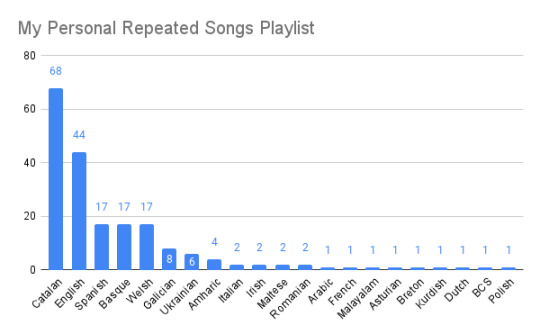
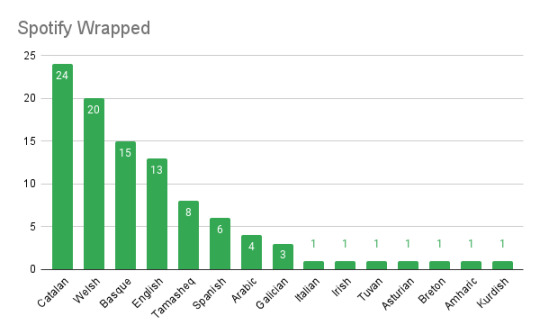
Because I am nothing if not an insufferable little numbers guy, and also I hadn’t yet posted my October review of my yearly “songs I repeated too much or that got stuck in my head for a week straight” playlist, I thought it might be interesting to compare the numbers between that and my Wrapped. The personal playlist usually includes things that are more salient to me or that I actively listen to, and the Spotify Wrapped one includes things from playlists that I might have listened to over and over but the specific songs didn’t stick out. On the other hand, Spotify Wrapped’s version is weighted towards the songs that I listened to more, whereas the other one could include songs that I liked for a week and then forgot to ever listen to again. In light of that, I think it’s very notable how much more music in Welsh I listened to this year. Part of that was thanks to making some playlists for friends (as was the Basque) but also there really were just a whole bunch of songs that I had on repeat, and that makes me really happy! I feel like I enjoy learning languages a lot more when I like listening to music in them, especially when I start understanding the lyrics, which I’m really starting to for Welsh and Basque. Anyways, this year I hopefully discover lots more good music, and hopefully start to get into more stuff in Amharic, Malayalam, and other of the languages I want to improve at as well.
#i did do a thing in january/february where i had to listen to music in a specific language on a specific day of the week#which was great for amharic and less effective for malayalam#and pretty good for basque and welsh#it was def a mess for catalan but also it made me appreciate how much music i like to listen to in catalan so that was nice#anyways interesting experiment and maybe i'll try it again now that i'm not in classes#also. for the record. basque occupied almost all of the top spots on my wrapped#and welsh also occupied a good number#which is a great sign#all of this to say that hopefully i'm not listening to too much in english because i need input in other languages#it did jump sharply in my personal playlist (mix of eurovision and folk songs/shanties but grrrrrr nonetheless)#anyways you guys should do this too come be an insufferable little numbers guy with me <3#perce rambles
6 notes
·
View notes
Text
my romantic soul wants for company or perhaps just heavy sleep
#thoughts#i just finished the souls of black folk by web dubois for english class. his prose is just so so beautiful and the emotion heartrending#i would love to write so eloquently so#someday but i feel as if i may need to live a long life beforehand#reading or hearing beautiful words always brings me great satisfaction though#i feel often that i was born to love words and love the beauty in language#its my endless joy my talent and like a hyperfixation#i hope i can lwarn more beautiful prose and eventually make something similar
1 note
·
View note
Text
The thing with the Mari Lwyd, though, is that it's being... I don't know, 'appropriated' is the wrong word, but certainly turned into something it isn't.
Thing is, this is a folk tradition in the Welsh language, and that's the most important aspect of it. I feel partly responsible for this, because I accidentally became a bit of an expert on the topic of the Mari Lwyd in a post that escaped Tumblr containment, and I clearly didn't stress it strongly enough there (in my defence, I wrote that post for ten likes and some attention); but this is a Welsh language tradition, conducted in Welsh, using Welsh language poetic forms that are older than the entire English language, and also a very specific sung melody (with a very specific first verse; that's Cân y Fari). It is not actually a 'rap battle'. It's not a recited poem. It is not any old rhyme scheme however you want.
It is not in English.
Given the extensive and frankly ongoing attempts by England to wipe out Welsh, and its attendant cultural traditions, the Mari is being revived across Wales as an act of linguistic-cultural defiance. She's a symbol of Welsh language culture, specifically; an icon to remind that we are a distinct people, with our own culture and traditions, and in spite of everyone and everything, we're still here. Separating her from that by removing the Welsh is, to put it mildly, wildly disrespectful.
...but it IS what I'm increasingly seeing, both online and in real world Mari Lwyd festivals. She's gained enormous pop-culture popularity in recent years, which is fantastic; but she's also been reduced from the tradition to just an aesthetic now.
So many people are talking/drawing about her as though she's a cryptid or a mythological figure, rather than the folk practice of shoving a skull on a stick and pretending to be a naughty horse for cheese and drunken larks. And I get it! It's an intriguing visual! Some of the artwork is great! But this is not what she is. She's not a Krampus equivalent for your Dark Christmas aesthetic.
I see people writing their own version of the pwnco (though never called the pwnco; almost always called some variant on 'Mari Lwyd rap battle'), and as fun as these are, they are never even written in the meter and poetic rules of Cân y Fari, much less in Welsh, and they never conclude with the promise to behave before letting the Mari into the house. The pwnco is the central part to the tradition; this is the Welsh language part, the bit that's important and matters.
Mari Lwyd festivals are increasingly just English wassail festivals with a Mari or two present. The Swansea one last weekend didn't even include a Mari trying to break into a building (insert Shrek meme); there was no pwnco at all. Even in the Chepstow ones, they didn't do actual Cân y Fari; just a couple of recited verses. Instead, the Maris are just an aesthetic, a way to make it look a bit more Welsh, without having to commit to the unfashionable inconvenience of actually including Welsh.
And I don't really know what the answers are to these. I can tell you what I'd like - I'd like art to include the Welsh somewhere, maybe incorporating the first line of Cân y Fari like this one did, to keep it connected to the actual Welsh tradition (or other Welsh, if other phrases are preferred). I'd like people who want to write their version of the pwnco to respect the actual tradition of it by using Cân y Fari's meter and rhyme scheme, finishing with the promise to behave, and actually calling it the pwnco rather than a rap battle (and preferably in Welsh, though I do understand that's not always possible lol). I'd like to see the festivals actually observe the tradition, and include a link on the booking website to an audio clip of Cân y Fari and the words to the first verse, so attendees who want to can learn it ahead of time. I don't know how feasible any of that is, of course! But that's what I'd like to see.
I don't know. This is rambly. But it's something I've been thinking about - and increasingly nettled by - for a while. There's was something so affirming and wonderful at first about seeing the Mari's climb into international recognition, but it's very much turned to dismay by now, because she's important to my endangered culture and yet that's the part that everyone apparently wants to drop for being too awkward and ruining the aesthetic. It's very frustrating.
11K notes
·
View notes
Text
I went to see the transhumance last week and it was an experience! I've lived here for five years and I'd never been to this event despite it being advertised in the library & town hall every year because I thought, it's just cows crossing a town on their way to their summer pastures, it's not that interesting—but I didn't realise that people turned it into a whole party, as people tend to do. When I arrived in town I found that a nearby field had been (temporarily) turned into a car park to accommodate the many, many visitors who came to see the spectacle—and I was like, maybe I've been missing out on something.

The town was festooned with tassels and garlands (some of the cows were also festooned, with big pompons on their horns) (festoon is a really great English word.) When I arrived there was a thriving little market with several cheese stands, because of course people would take this opportunity to sell their cheeses. They also sold bread, fruit, and cow milk-based desserts including ice-cream, so you were covered if you wanted lunch. (Unless you're lactose intolerant. I'm sorry.)

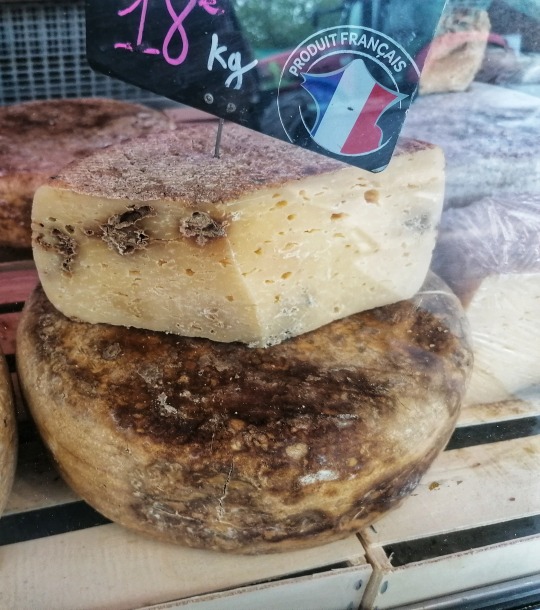
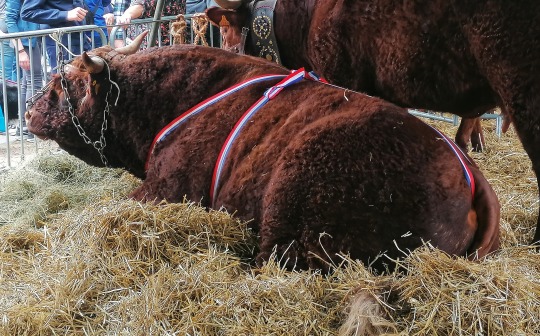
There were also folk dancers, and a contest going on where you had to guess the weight of an absolutely massive bull (see above). (My guess was way off, he weighed 1 200 kg!) There was a stand with a guy selling beautiful, framed photos of his cows. In one photo a cow was whispering something in her friend's ear. Nearby some prize cows were waiting to be paraded around and one of them was wearing a halter with a little heart <3


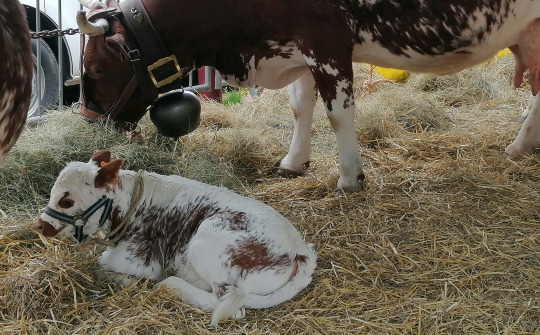
(I was invited for apéritif at a neighbour's house a few months ago, he's a retired farmer and he had old Kodak photos of his cows from the 1980s and 90s all over his house. He remembered their names and personalities.)
There was also a stand selling a dizzying variety of cow bells, and I've been resisting the temptation to buy a cow bell for five years now because, well, it's such a cliché tourist thing to buy, but I will probably end up buying one someday. It's hard to resist their allure. I'm not sure which of my animals will have to deal with the humiliation of wearing a bell for a few hours and being photographed cosplaying as a cow against his will.
(Definitely Pirlouit.)

I was buying an ice-cream and asking the vendor if the cows were fashionably late when finally, the herds started arriving. One herd would cross the town, with onlookers clapping and cheering (including from their balconies), then people went back to buying cheese and watching the dancers or the brass band, and commenting on the prize cows strutting on the plaza, then another herd would arrive half an hour later and children would run ahead to warn everyone "They're coming!" (kids love being sentinels) and people would eagerly gather again to clap and cheer as they walked past, and it went on like this all day. You'd think you might get tired of eating ice-cream and clapping for cows but no, people were still enthusiastic when the last herd came.

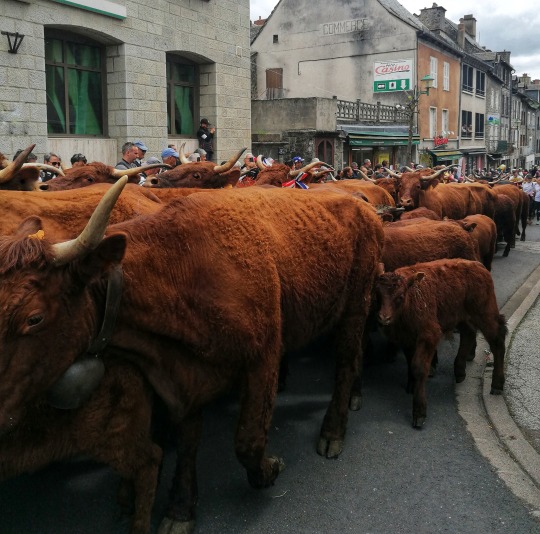
Imagine being a local cow, and every year when your owners take you to your summer pastures in the mountain you cross a town where people are eating cow milk ice-cream and clapping for you gratefully as you walk past, and buying cow merch (like bells) and admiring an exhibit of framed photos of you and your friends, and watching cow supermodels walking the catwalk on the plaza, and just as you think you've reached maximum levels of appreciation you reach the entrance of town and there's a lifesized statue in your honour in the middle of the roundabout. These cows must have such solid self-esteem.
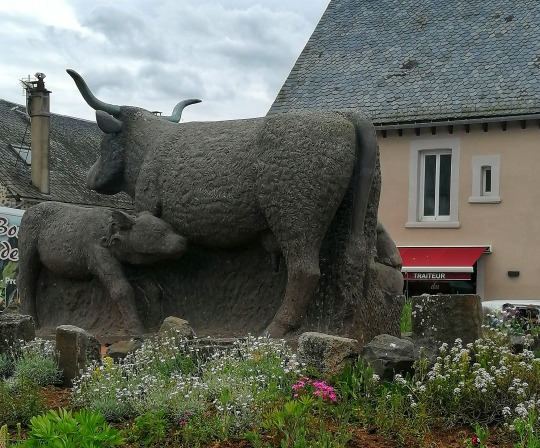
2K notes
·
View notes
Text
there really is a cultural pressure for transmascs & men to detransition, and it comes from all sides. it comes from the queer community too, not just terfs and cishet transphobes.
it took me a while to realize why transphobic people and transandrophobic queers utterly despise trans guys & mascs who are over the age of like 25- it's because it pisses them right off that we've resisted their attempts to make us detransition. it makes them so angry to see they were unable to groom that person into a life of self-shame and repression. it really seems like MOST people believe that trans men will just detransition eventually in life? people NEVER think about older trans men, only teenage trans boys and trans men in their very early twenties.
when i was involved with my local punk scene i was addressed with condescension, almost everyone around me didn't accept transmasculinity as a legitimate identity and thought that we would've transitioned by now in life. i encountered folks who would talk about transmasculinity with subtle disgust that made me feel like i was doing something wrong, and people who expressed overt disgust, saying in plain english that they were disgusted by breasts and vaginas because they were gay men. all along the way i was literally mocked for not having a penis, and one of my roommates started treating me differently once they found out i didn't have one (because they were attracted to me)
i've been on T for 9 years, and been out as a trans man for a bit longer than that, and i noticed as i've aged i've also attracted a lot of folks who have tried to deter me from identifying as a trans man, either through directly telling me that trans men are inherently dangerous, or by implying that women or another gender are safer, quieter, calmer, "less traumatizing to be around," etc. one of my exes told me they were terrified to date me (despite literally going out of their way to do so for over half a year) because they were scared i would be transphobic to them because i'm a transmasculine lesbian.
i received pressure from online friends to either detransition and become an intersex butch woman, or to something feminine adjacent or nonbinary. for years i dealt with a few friends who kept subtly hinting that i should stop identifying as a trans man or trans masc because of how awful transmascs are- going as far as to sending me screenshots of transmascs speaking, complaining about them and calling them whiny, annoying. talking about how all transmascs are entitled, how all transmascs take things too personally, how we complain too much, and so on.
people make no effort to make space for transmascs and men. i met 0 transmascs in my local punk community that i was able to stay in contact with. none. i met a few in passing but none that actually were introduced to me in a capacity where i could actually try to befriend them. it really felt like other punks in the scene were desperately trying to keep the transmascs apart at times. excuses were made as to why i couldn't hang out with other transmascs i liked, but i was constantly being forced to befriend transphobic cis gay men and transandrophobic transfemmes who outwardly expressed hatred and disgust of us. it really felt like it was on purpose... almost as if other members of this community wanted our attention, but never wanted us to give each other attention or a sense of community. like we were objects, not people to be included in the community for real. satellite friends, if you will.
i'll be honest with you. i was at my lowest at this point. i realized i wasn't just a trans man and that i'm a genderqueer person who experiences multiple genders, including womanhood and an "other" gender, which was great. however now i was being forced to completely stuff down being a man for the sake of other people. instead of folks telling me they'd rather not hang out with transmascs, folks rather just attempted to guilt me for identifying as such in the hopes i'd stop identifying that way. i was being told daily that trans men and mascs are inherently violent and terrible to be around. i was in discord servers where transmascs were being kicked constantly for getting even slightly upset about transandrophobia, or being unfairly targeted by staff.
it's violence, but nobody wants to call it that. i pulled myself out of there and am now able to contact other transmascs and trans men who are proud of who they are and have elevated me back into a headspace where it's okay to truly be myself. just keep in mind that if you feel like you're in that situation, you're not alone. people who attempt to groom others are often very subtle it's not always up front. they will start slipping in hateful sentiments very slowly and make you feel like maybe they're the ones who are actually right.
it feels good to be an almost 32 year old trans guy. there's nothing to be ashamed about there. people project their feelings on to my gender and that has nothing to do with me. it has nothing to do with you, either. people will just project on to you for whatever reason- hatred is usually the motivator there. if you encounter folks who keep trying to badger you out of identifying as your gender, no matter who you are, transmasc, transfemme, transneutral, trans anything- they are not good for you. they are not your friends. they do not accept you as you are and you deserve so much better.
#transmasc#trans#lgbtqia#lgbtq#lgbt#queer#gay#lesbian#bisexual#genderqueer#non binary#nonbinary#enby#ftm#transmasculine#trans man#trans men#transgender#transsexual#ftm gay#trans gay#trans lesbian#transmasc lesbian#butch#butch lesbian#dyke#genderfluid#intersex#about us#our writing
2K notes
·
View notes
Text
ShinRan Week 2023: Day 5 | "I wish I could tell you that I love you"
I wish that I could tell you I wish that I could run into your arms
[Song link] [YouTube link]
#detective conan#case closed#shinichi kudo#ran mori#conan edogawa#shinran#shinranweek2023#amv#my amvs#video#eye strain#funimation english dub script#song is 'i wish that i could tell you' by gabrielle grace#i know i way missed the grace period but i've been working very hard on this for the past couple of weeks and better late than never right?#i was way way ambitious and probably should have just edited with the chorus to get it done in time... but the beginning felt fitting!#i really hope folks like this one 🙏#sources used are episodes 1 2 22 49 85 128 174 190-193 263 288 522-524 854 928 and 994#movies 3 4 7 13 (for the star background only) and 15#ova 9 and ops 16 24 25 and 46 and eds 9 49 and 59#and tv special 6 (episode one: the great detective turned small)#voice clip sources are (in order) ep 10 ep 101 ep 2 movie 3 ep 42 ep 39 movie 4 and ep 3
135 notes
·
View notes
Text
So, the other day, Crash Course uploaded a video in their Religions series, about Judaism. Now, I haven't watched any video other than this one, but if this one is any metric to measure by.... well, it's bad. Really bad.
To start, the introduction starts with "shabbat toothbrushes", where John Green describes to us how (some) jews will brush their teeth on shabbat, while ensuring to not break any of the melachot, or prohibited actions. This, in my opinion, as an orthodox jew, is.... quite a framing to start with. Especially since immediately after that introduction, John Green let's us know that there are other jews! who don't do this! and just... sir, I'm an orthodox jew. Sure, I don't do follow that rule on the shabbat- sorry, the sabbath which you then explain is the shabbat to jews (the word Sabbath comes from the hebrew Shabbat), but I follow a lot of rules that folks find strange! And I do not appreciate a video talking about jews sidelining orthodox jews. Framing the video in that way is clearly an attempt to make Jews seem more "mainstream", but it erases, estranges, and (this happens more later on) villifies orthodox jews. Which isn't fair.
But we just started this 13 minute video. At this point last night, I sighed and figured this was going to be just your regular old "Orthodox Jews are strange and bad" sort of video, and resigned myself to that. And then I looked at the sections of the video. One of which included Zionism in it. And I immediately got more worried, because John and Hank donated through Project For Awesome to UNWRA which are.... very linked to Hamas, including there being evidence of UNWRA employees participating in the Oct. 7th Massacre. But okay. Maybe this video will be fine.
Spoiler alert: It wasn't. It was so incredibly bad. John Green admits at the start of the video that Judaism is complex, great! Now explain tha complexity correctly! no. So he starts off his history with... Ya'akov Avinu, sorry- Jacob. Who's a descendant of Avraham Avinu, sorry- Abraham (John uses the english names and not the hebrew one and it just bothers me). Which like... no, Jewish history starts with Eretz Yisrael, the land of Israel. In addition, a large majority of his sources are non jewish sources which is just. Why. There are so many jewish sources on Judaism!
As this is getting long, I'm gonna put a tl;dr here and then a read more cut. The tl;dr is this - the video is a horrendously western view of Judaism video, that seems to be written by non-jews who don't have any expertise in Judaism. It is filled with misrepresentation of jews, especially religious ones, is severely lacking pretty much all of jewish history, doesn't mention MENA/SWANA jews at all, and is quite frankly a disappointment. I'm mad and sad and upset and most of all disappointed with crash course for creating this video.
Still with me? great. I'm wordy and I have twelve minutes of this video to go through still. To make this a bit more organized, I'm gonna go according to the sections that John Green himself gave, and give a summary of what he said and what is wrong or misrepresented there.
The Many Versions of Judaism (aka, somehow not our history nor our story) there are a few things wrong/upsetting here. First off, as I said above, the fact that he uses the English names. Second off, the fact that he, bafflingly, starts the story with Ya'akov getting the name Yisrael, aka when Ya'akov fights with the angel. John then takes this to explain that Jews today still wrestle with Hashem in our own way, but in a... shall I say tumblr style reductionist way. Y'know, the "jews shake lemon at gd angrily behind a denny's" way. This chapter is the only one that will ever mention the ancient Israelites, and never the tie to the land of Israel itself. In addition to this, he describes Judaism as monotheistic, but that "half of religious jews today believe in some other spiritual force, and not the gd of the Hebrew Bible" which had me going what in the what. Just. No. like, sure, i'm a vaguely agnostic-atheist religious jew and uh, no? And I found his source, and well, if I had to guess - the jews who responded assumed that the god they were being asked about was the one in the xtian bible - and so answered no, while John assumed said jews meant the gd of the tanakh, aka hashem. Third, his "devil's advocate" scene is just. Once again, putting down Orthodox Jews, and compares without change Jewish Religious Institutions with Xtian ones. To quote "for a lot of jews, it's more about action than faith", I'd argue, personally, that that line is correct for most jews, as our religion is not really one of belief (orthodoxy) but of action (orthopraxy). And also, I'll paraphrase "many jewish people consider following Jewish law to be the most important thing" yes! yes we do! and not just many, most, that's! the whole! shtick! for us!! (and yes i'm aware this is a simplification). He also manages to vaguely describe Judaism as an ethnicity, and explain that some Jews are connected to the ancestral history (without explaining what that is, no connection to Israel here no sirree), which I guess is fine-ish? (it does not)
The Written Torah So here he starts off with saying that we'll focus on the torah and not the tanakh, as the torah is how we jews conceptualize our relationship to gd and each other. Except that... we also use the rest of the Tanakh for that! (minor kudos to him for saying that the tanakh was written by the ancient israelites. Just no mention of why there were ancient israelites and then we had to come back). The torah gives us most of our rules, but the tanakh expands on them, and teaches us how we choose to treat hashem, how we treat each other. When Jews say the written torah, we do oftentimes also mean the rest of the tanakh. Frankly, going through his sources, I can't figure out what source he used for this claim, except that he uses a lot of non-jewish sources (like the britannica), and very few Jewish ones which is just... why, you can clearly see these jewish sources exist, why not use them? I understand that this is meant to be lighthearted, but he compares the five books of the torah to seasons of friends, which is kinda eeeh. And added to that, his descriptor for bamidbar or numbers is "the ancient israelites wander and suffer through the wilderness" (paraphrased). First off, it was the desert, and second off this is exactly where in the torah we get all of the mitzvot and how to treat each other and hashem. This is it!! why name the book/"season" wrong?? He then continues and talks about how the themes of exile and return are common in the torah, and continue to resonate today, and yet doesn't... explain... the history of us being exiled. Instead, we take a tangent into antisemitism, specifically the plague related kind. Which... fine, I know he's got a liking for that aspect of history, but there's so much more. Of course, he also mentions that the Pope was one of the influential people who pushed back against it and... just... sigh. We're talking the catholic church here. The same catholic church WHO BLAMED JEWS FOR KILLING JESUS TILL THE NINETEEN SIXTIES. If the pope pushed back against it, it was because us jews had more value alive, not because he thought we had inherent value as people. Of course, since we're talking antisemitism, John only talks about xtian antisemitism. The "happy dhimmi" myth is alive and kicking in this video, as there is absolutely no mention of antisemitism within the non-western world. IN ADDITION, by framing the antisemitism the way he did - that the "dumb europeans" attacked the jews but their religious leaders were against it, John inadvertently erases antisemitism by non religious people, and by religious leaders. Both of which are and were alive and well.
Zionism (aka, I had to put this in here otherwise the tankies would yell at me, and I made a mess of it) And then we have this digression, which makes zero sense in the context of the story John is attempting to tell, into Zionism. There is no reason for it, and if it had to be in the video, it should have, quite frankly, gone in at the end. But that is only the start of the woes that I have to say on this section. To start, the amount of sources here are negligeble as compared to the other sections (note the numbers, all previous sources were for the other two sections)
48. Encyclopaedia Britannica | Zionism 49. University of Michigan | Zionism 50. Ben-Israel, Hedva. “Zionism and European Nationalisms: Comparative Aspects.” Israel Studies 8, no. 1 (2003): 91–104. 51. Ghanem, As’ad. “Israel’s Second-Class Citizens: Arabs in Israel and the Struggle for Equal Rights.” Foreign Affairs 95, no. 4 (2016): 37–42. 52. Halpern, Ben (2004) [1990]. "The Rise and Reception of Zionism in the Nineteenth Century". In Goldscheider, Calvin; Neusner, Jacob (eds.). Social Foundations of Judaism (2nd ed.). Eugene, Or: Wipf and Stock Publ. pp. 94–113. 53. American-Israeli Cooperative Enterprise| Zionism: Anti-Zionism Among Jews
[copied from the source sheet]
I haven't read the sources, so I'm not going to talk about them, but the fact that only half of the sources seem to have been written by jews is... not great. At all. And then there's how John introduces and talks about the topic. John compares the themes of exile and return in the Torah and Tanakh to the narrative told by Zionists, and mentions Zionism being a political movement. All of this is correct. However, what John is very obviously missing here is the history of Jews within the land of Israel. He talks about how we wanted a state for Jews run by Jews, but doesn't explain that we wanted it in the land where we came from, a land where we have mitzvot, commandments, that are specific to it. A land that our holidays and calendar center. The fact that this is missing is one of the glaring issues in the whole video. He also mentions that Zionism views Judaism as a nationality, which is true. Judaism is viewed as a nationality in the modern sense through Zionism, but it's also a nationality, or nation, in the older sense, regardless of Zionism. In addition to that, while Zionism is the idea of having a Jewish run state for Jews, it does not preclude the existence of other, nonjewish, people in this state. Which is important for the next bit. He then adds that, quote "this is complicated for lots of geopolitical reasons, but suffice it to say, Jewish people are not the only people with roots or a current presence in the modern state of Israel." Which, I guess does mention our roots in the land, but it also completely flattens the whole story into, what feels to me, "Jews Zionists bad for wanting a state because there are other people". He then mentions the Druze and Xtian and Muslim Palestinians, which is fair but also why specifically the Druze? And if the Druze, why not also the Bedouin? Both are minority groups within Israel, and if you want to talk about minority groups, the Bedouin are equally as important for this discussion! (another friend later pointed out that the likely reason is that the pbs source John uses mentions the Druze (but as muslims, and not as their own religious group which. sigh. Druze are not Muslim), but not the Bedouin. And of course, we get a "not all jews support the zionist movement, but many do" yeah. a huge womping majority. For a reason. At the end of this section he says you can find "much much more" on the topic in the sources and I just have to raise an eyebrow, because I do not count these 6 sources as "much much more" information.
Then, finally, we're off of this ill-placed and wrongly done section, and back to actual religion things. You know. Like how John had said we'd be talking about.
The Oral Torah and the Talmud We start off strong, with an accurate description as to what exactly is the Oral Torah, and what its place within Jewish society and Judaism is. And then... John tells us that there are "two guys who started it". Huh? Who? Hillel and Shammai of course! what. so, to explain to all of you who have somehow read till here and don't know, Hillel and Shammai are just one pair in a long lineage of those who were, according to tradition, in charge of the oral torah. Even more so, they weren't the first in their generation of pairs! (this is the time known as the Zugot, or pairs). Hillel and Shammai are the seventh generation in those who lived during the time of the mishna being slowly worked on and getting codified, and Rabbi Yehuda HaNasi was the one who did all of the codification, FIVE GENERATIONS AND A TEMPLE COLLAPSE AFTER THEM. So I chose to go into the sources to figure this one out, because frankly I'm baffled. And as far as I can tell, this comes from the encyclopedia britannica (again, why) saying that Hillel and Shammai were the last of the Zugot and that they taught the Tanaim (those who ended up writing the mishna), but just. What. Why. John then continues on to explain who Hillel and Shammai are, describing them as "Shammai, the rules are rules type" and "Hillel, the gentle, caring, impossible to anger type". I just- again with the putting down of one side (the stricter side) for the not so strict side. In addition to the fact that that isn't even an accurate description. It would be more accurate to describe the divide and debate between Hillel and Shammai as realistic and unrealistic. Hillel's school of thought, also known as Beit Hillel, worked with and around torah with the understanding that those who will be following it are people, and will make mistakes and need leniency. Shammai's school of thought, known as Beit Shammai, on the other hand, wanted people to strive to following the Torah in the most idealistic way. We follow Beit Hillel nowadays because they were better at taking day-to-day realities into account, but we remember Beit Shammai's halacha because we want to be able to fulfill our mitzvot in that way, and if human life didn't get in the way, we would do so. John Green stop putting those who keep stricter (or more idealistic) halacha as "bad" challange: level impossible. John Green then says, as is correct, that at around 200ce we started writing things down, but once again, he neglects to mention why we felt we needed to shift from oral to written (the answer is the Romans wanted us no longer jewish and we had lost our Temple and were going to be expelled from our holy land again, see, that's two sentences, is that so hard to say?) John Green then correctly explains that they way the Talmud was written down was by layers upon layers, "literally circling each other" however, that's only one portion of the halachic debate, and frankly, the Talmud is definitely not the central rabbinic text today. That's the Shulchan Aruch, which is based off of the Talmud, but collates all of Halachic debate into a masterpiece of a lot of books. It, too, has the layers upon layers thing, because why waste good paper space??? There are more mistakes here, in understanding that the Talmud is The Central Halachic thing, which again - look above I corrected it. I'll also happily admit that he's correct in saying that when we refer to the torah we mean both the written and oral ones. But we still have two sections to go, and I am still as wordy as ever.
Branches of Judaism Here is where I started to go from mildly annoyed at how he treats orthodox jews, to flat out mad. See, instead of explaining the differences between branches in a neutral way, John brings up differences that will make people feel things. He gives examples of questions - can women be rabbis - which will have listeners biased towards those communities that allow it (and yes, it is an issue within orthodox communities, but guess what! these communities are also trying to work within their framework of halacha for women's equality), or "can you push an elevator button on shabbat using electricity when the law says to refrain from creating fires and sparks on that day", which is an extreme oversimplification of the whole argument and discussion about electricity on shabbat, which will lead viewers to, once again, view those who do those things as backward, strange, and weird. And trust me, there are so many other halachic questions that can be used (such as can one heat food on shabbat, considering fire and heat, or how you deal with the dietary laws of kashrut), and idk. Maybe at this point I'm nitpicking, but as an orthodox not exactly a woman, it bothers me! It alienates me from the discussion, and it's really frustrating. He comments that the options you can choose are "unwavering, flexible, or somewhere in between", which to me shows a complete lack of understanding of what the orthodox framework of working with halacha is (too long; don't have time to explain - we can't strictly disagree with stuff but we can slowly push for change that may eventually end up disagreeing with something or another). He then explains Orthodox, Conservative, and Reform Judaism. His way of explaining is, while technically correct, missing an understanding of how we different streams of Judaism practice. John describes the differences as ones of strictness vs openness, lack of change vs flexibility. In reality, the difference between the streams is one of precedence. How much weight do we put on something that was written 2000 years ago? How much weight does our current way of living have? Orthodox Judaism will answer that what was written all that time ago has significantly more weight, that they knew more about halacha than we do, to Reform halacha, which takes halachic rulings from 2000 years ago under advisement, but sees how much the world has changed, and makes the rulings accordingly. I won't touch on his specific examples, and suffice it to say that they were in line with what I said earlier about his examples. They're there to make you feel something about these strange jews he's talking about, and that something is not always particularly nice, especially to Orthodox Jews. He then mentions a few other options, which is fine (though I wish he expanded on the "people who say 'I'm Jewish' but don't identify with any particular branch" as, with everything going on, and his sorely lacking explanation in how Judaism and conversion works, may lead to people deciding to just say they're jewish). After that he says that there "are jewish atheists". Yes. There are also orthodox jewish atheists, I thought we covered the fact that Judaism prefers action over belief at the start? I'm confused as to why he felt the need to add that here near the end of the video.
Next, he talks about the different physical branches of Judaism, and mentions that due to persecution we got to many different places. Of course, he once again neglects to mention the ur-persecution, or ur-reason that we are so spread out - our expulsion from Israel, and the beginning of the Jewish Diaspora (he mentions the Diaspora by name, but not the first reason for it). It's a glaring miss, but not as glaring as what is to come. He then talks about three diasporic communities, and I quote "...unique communities emerged in each new location: Ashkenazi Jews in Eastern Europe, Sephardic Jews in Spain and Portugal, and Beta Israel in Eithiopia". One nitpick and one incredibly important correction. Ashkenazi Jews were originally from ashkenaz, ie France and Germany and eventually got to Eastern Europe as well - the name of the general European tradition is, however, Ashkenaz. The second, and more pressing issue, is that he says that Sephardic Jews are in Spain and Portugal. Those communities haven't been there in a Hot Minute, ie since the Spanish Inquistion. They've been in the SWANA or MENA region, with some exceptions for some Dutch, American, and British Jews. I had to look at his sources, because are you kidding me. Both (all three, if we include Beta Israel) sources are from britannica. Again. My first instinct was that maybe the issue was with the source! I was wrong.
The source for Ashkenazi Judaism (emphasis mine)
Ashkenazi, member of the Jews who lived in the Rhineland valley and in neighbouring France before their migration eastward to Slavic lands (e.g., Poland, Lithuania, Russia) after the Crusades (11th–13th century) and their descendants. After the 17th-century persecutions in eastern Europe, large numbers of these Jews resettled in western Europe, where they assimilated, as they had done in eastern Europe, with other Jewish communities. In time, all Jews who had adopted the “German rite” synagogue ritual were referred to as Ashkenazim to distinguish them from Sephardic (Spanish rite) Jews. Ashkenazim differ from Sephardim in their pronunciation of Hebrew, in cultural traditions, in synagogue cantillation (chanting), in their widespread use of Yiddish (until the 20th century), and especially in synagogue liturgy. Today Ashkenazim constitute more than 80 percent of all the Jews in the world, vastly outnumbering Sephardic Jews. In the early 21st century, Ashkenazic Jews numbered about 11 million. In Israel the numbers of Ashkenazim and Sephardim are roughly equal, and the chief rabbinate has both an Ashkenazic and a Sephardic chief rabbi on equal footing. All Reform and Conservative Jewish congregations belong to the Ashkenazic tradition
As you can see, britannica does in fact mention that Ashkenazi Jews were first in the Rhineland valley (germany) and france, and later moved to Eastern Europe. I have some nitpicking on that as what I said doesn't match but regardless. Ashkenazi Jews aren't in Ashkenaz according to John, they are in Eastern Europe
The source for Sephardi Judaism (emphasis mine)
Sephardi, member or descendant of the Jews who lived in Spain and Portugal from at least the later centuries of the Roman Empire until their persecution and mass expulsion from those countries in the last decades of the 15th century. The Sephardim initially fled to North Africa and other parts of the Ottoman Empire, and many of these eventually settled in such countries as France, Holland, England, Italy, and the Balkans. Salonika (Thessaloníki) in Macedonia and the city of Amsterdam became major sites of Sephardic settlement. The transplanted Sephardim largely retained their native Judeo-Spanish language (Ladino), literature, and customs. They became noted for their cultural and intellectual achievements within the Mediterranean and northern European Jewish communities. In religious practice, the Sephardim differ from the Ashkenazim (German-rite Jews) in many ritual customs, but these reflect a difference in traditional expression rather than a difference in sect. Of the estimated 1.5 million Sephardic Jews worldwide in the early 21st century (far fewer than the Ashkenazim), the largest number were residing in the state of Israel. The chief rabbinate of Israel has both a Sephardic and an Ashkenazi chief rabbi. The designation Sephardim is frequently used to signify North African Jews and others who, though having no ancestral ties to Spain, have been influenced by Sephardic traditions, but the term Mizrahim is perhaps more properly applied.
As you can also see, the britannica also mentions that Sephardi talks about North African Jews. What is that? SWANA Jews exist? and experienced persecution? Couldn't be. Surely all Jews are actually European and are colonizers in the land of palestine (heavy sarcasm and cynicism). I've got to say, I find the fact that using where Jews ended up for Ashkenazi Jews, and where they "originated" (in quotation due to the fact that only the name originated from there) for Sephardi Jews rather disingenuous, as the story being told erases the existence of SWANA jews to an upsetting and worrying degree.
Review and Credits Almost done. Just have to get through the review. John finishes up the story with something that I have mixed feelings about. He describes Judaism as a religion, but that being Jewish doesn't require a religious identity. I find the but annoying. It's not "judaism is a religion but doesn't have to be", it's "judaism is a religion and a people, and a culture, etc etc". Judaism is older than the concept of religion, we're a people, who can also have a set of belief and behaviour, but not doing them does not preclude you from being part of the family (unless, of course, you actively leave the family but that is a nuance not for here). The rest of his review is fine in my opinion. And now, the credits, which have a list of names that don't seem to be Jewish, but I can't find that about all of them (i know at least one of the people in charge of information for either this video or the series in general is definitely not Jewish)
I don’t know how to finish this, other than… Do better, Crash Course, do better @sizzlingsandwichperfection-blog.
449 notes
·
View notes
Text
Hey Tumblr, there's a new historical/period comedy series on Netflix which you will love! It's called 1670! It's about Polish nobility and their peasant-thralls. However, Netflix is not promoting it to international audiences, bc it's Polish, even though there are subtitles available in so many languages!
It has:
Great Humour
Amazing Polish Folk Music
Historical Costumes that are not Western!
CANON LESBIANS
One of the said lesbians is a repressed lesbian w religious trauma & the subplot lasts longer than one episode
Priest Jakub
A really good combination of making historical and ahistorical jokes
And much more!
Seriously, give it a watch bc I'd hate to see only my Polish mutuals watch it, it's new, it's fresh, it's witty, not another remake, and it shows another culture & history! (aren't you tired of watching yet another show on the English monarchy, then 1670 is there for ya)
3K notes
·
View notes
Note
Hello! i was wondering- what kind of things one should avoid doing when interacting with little people? and what things would be kind to do? other than being polite like one would be with anyone else, and not touching someone without permission, of course. As an example: a handshake, should the squeeze be lighter than usual? i assume since the hands are smaller, they might be more sensitive? or is that incorrect? Another example, would it be polite or rude to offer to sit down somewhere, so the other person and i can be at eye level? or is that not particularly important? I'm worried about being rude or hurting someone by accident. sorry for any confusion, english isn't my first language.
Hello! I may have discussed etiquette like this before, so do please check out my faq tag and dwarfism 101 tag, but I'm happy to revisit!
Handshakes with little people can certainly be impacted by the small hand size, but for the most part it is the same and their hands are not more sensitive. (Unless of course they have arthritis, or an additional condition that would effect that)
Taking a seat is indeed a great way to be eye level with someone of short stature. Most little people find it rude when tall folks choose to bend over, squat, or take a knee when talking to us. (It is of course still up to personal preference) I do not mind simply looking up to speak to people when standing, it is very normal for me, but for longer conversations it can be tiring on my neck, so sitting together is a great solution.
When in doubt, don't be afraid to ask questions on an individual basis. It's great to lead with "Can I ask you some questions about your disability?", "I want to make sure you are comfortable, what can I do to ensure that?", etc. Hope this helps!
242 notes
·
View notes
Text
A Reflection Of Venus

chapter: 1 chapter 2
pairing: emperor geta/emperor caracalla x acacius' daughter!reader
summary: For years Acacius was able to keep his precious and only daughter away from the Emperor's eyes. But after his latest victory, he couldn't evade the already inevitable.
warning(s): mention of alcohol consumption | swearing | sexual implications | semi-edited | english is not my first language, faults may occur | please let me know if i missed anything
Note: Reader is the daughter of General Acacius and his wife, which is not Lucilla in this fanfiction.
word count: 3.1k
General Acacius was a hero for the Roman Empire, a sun that was burning brighter with every new victory he won in a new war campaign ordered by Emperor Geta and his twin brother Emperor Caracalla. The reign of the twins was nothing compared to one of their deceased father Emperor Septimius Severus, who was once one of the closest friends and brother-in-arms of Acatius. While Severus fought wars mainly to protect the borders of the already massive Empire, his sons' hunger for expansion became clear from the very first day they inherited the title "Emperor". And general Acacius became their tool in this project. Nothing was too expensive, they backed him with legions, war-ships, the best equipment and supply, and the capable general became an unstoppable force, a soldier of the God Mars himself. But at what cost?
As the years went on, he'd rarely been home, always travelling with his marching soldiers and being on the front line of every battle he fought. And when he came back, he felt sick from all the pomp and gold the Emperor's threw at him, the victory processions through Rome, while the smell of blood still lingered in his nose and the cries of the women and children echoed in his mind. It was one of those days. The sun stood high over the wide street that lead to the Palatin, the sides filled with the cheering crowd - common people, soldiers, slaves, senators, merchants, they all celebrated his victory in a triumphant procession. His marching soldiers were led by Acacius chariot, clothed in the white armor of a victor. His face could've been one to be carved in marble, stoic and upright, facing the great Palatin, where the Emperors would await him.
Geta and Caracalla - the twin-sons of Septimius Severus, Emperors of Rome. They stoof there in golden Armor like sun gods with their golden crowns on top of their short gingerblonde hair. Their unusual pale skin was a testament to their wealth as they could afford to stay out of the sun, which burns especially hot on summer days like this one, and of course on the battlefields in Africa, where Acatius' men had to fight against the rebellious Nubians. They awaited their victor with proud smiles on their lips, while Acacius' procession ended at the footsteps of the Emperor's palace. He walked the marble steps towards them, his long cloak moved in tact with his walk. He didn't look forward to see the faces of Rome's tyrants again, but they hadno idea.
Instead, he greeted them as he was used to. His hand on his chest, speaking the words.
"I greet you, my Emperors. Nubia is no more. I present a new victory to you, to the realm and to the Roman people."
With a proud look on their faces and a wide smile, the twins stepped forward. Emperor Geta hold the laurel wreath of victory in his hands and places it on top of Acacius' greying hair.
"And Rome rewards it's heroes with gratitude and admiration. We bow to your victories, General Acacius."
With those words, he offered him to turn around and face the celebrating crowd. Geta and Caracalla took their places at his side, giving him a moment of spotlight, applauded by the people, while they did benefit from it as well. Acatius was their general, their armored knight. Every victory he presented was another triumph for their own reign and power. After the earned celebration in front of the common folk, the Emperors and Acacius retreated inside, where servants quickly served them wine for a toast.
"Another great victory, you never disappoint us, dear Acatius," Geta expressed and hold his glass up for a toast, his brother Caracalla following the gesture. "To the glory of the Roman Empire".
"To the glory of your reign", Acacius lied and took a sip from his glass, trying to numb himself a bit with the taste of the alcohol. How he hated conversations with both of them.
" But don't get too comfy here, my brother and i were already discussing another campaign soon. You'll get everything you need, just tell us how many soldiers and ships and it will be granted," Geta explained, which left a bitter taste in Acacius mouth. His jaw clenched for a moment, while he tried everything not to show his distaste about another war campaign.
"Please forgive me, my Emperor, but isn't the realm big enough already? Rome has already difficulties to feed the people. Further expansion would-"
"They can eat war", Emperor Caracalla threw in with an almost diabotical grin, while Acacius got a warning eye from Geta. It was clear that his words weren't the ones both wanted to hear right now.
"Don't worry about things like that, Acacius. You're a military general, your job is to win battles - nothing more. Do you understand?"
"I understand," he answered, even though he hated to hear that he was reduced to this. He'd experienced war and peace alike and therefore he knew about the dangers of continuing this madness. Moments like this really let him question if those maniacs were of the same blood as Septimius Severus.
"But you're right, you've earned yourself at least a bit of rest - one or two weeks. Don't worry, we've taken care about the wellbeing of your family. They got everything they needed and more in our attempt to show our gratitude for your service to the throne. Speaking of which.... we expect you to join us for a great feast tonight - here in the palace. A party to celebrate your victory, it is accompanied by a couple of fights in the arena tomorrow," Geta explained joyfully, while Acatius tried to keep his mask up.
"I am incredibly honored, but would prefer to spend time with family after being away for such a long time."
"The Emperors show you their gratitude and you're insulting us. We expect you to come and you will come", Caracalla hissed with a sudden shift of tone, his eyes staring at Acacius in clear anger, while his brother placed his hand on his shoulder in an attempt to calm him down. But his staring eyes were warning Acatius once again.
"Of course, we don't just invite you, but your whole family. Bring your wife and... you have a daughter, if i'm not mistaken? We haven't had the pleasure of getting to know her yet, since you never brought her to any festivities. I am sure she will be delighted, if you don't plan on hiding her again."
Acacius stood there in silence, a reaction that made Caracalla burst out into laughter as if he'd just heard the funniest joke from his brother. The respected general didn't even look at him, why should he. Standing here in front of them should've been an honor, yet it felt like a disgrace. They were nothing but spoiled kids with the power of an empire in their hands. And now they even forced him to reveal his dear daughter to them. Something he tried to avoid for too long, knowing fully well about the debauchery and excessiveness of Geta and Caracalla.
"We're waiting for an answer, Acacius?", Caracalla purred with a wide grin on his pale face, revealing his gold tooth.
"It will be an honor to be your guest... together with my daughter."
_____________________________________________
You watched the face of your father sunken away in his thoughts, as you made made your way to the palace in a palanquin carried by a couple of slaves and protected by soldiers. The city was painted in darkness which made the palace seem like a temple with all the lights that welcomed you. It was an exciting moment for an upper-class lady to be a guest at the palace, especially for you, a woman that usually stayed away from the most parties. Not because you wanted to, but because it was an order from your father. You obeyed, yet it bothered you, even more when you'd reached the age of a young woman - the age in which it was expected from you to find a proper husband.
"Why are you so worried, father?", you finally managed to get off your lips, pulling Acacius out of the battle he fought in his head. He couldn't just tell you that he despised all of this and especially the Emperors himself as he couldn't be sure if someone outside this palanquin could hear him. So he simply took your hand and placed a soft and caring kiss on the ring that had been a present for your last name day.
"I guess I'm rather tired than worried. The parties in the palace are always quite excessive, music, dances, feasts... i just came back from the desert and now i have to enjoy all those things", he sighed and looked at you. "And i don't want to stay too long, especially not till the orgy starts. The servants will come and bring us home before that." And even you knew he would rather go and murder Dyonisos himself than allowing his daughter to stay and witness this.
All those words and yet you knew it wasn't everything.
"I'm glad that you take me with you this time. I've only known the imperial palace from afar," you confessed, while you straightened the long, blue dress you wore. It was decorated with all sorts of silver embroidery and jewelry, encapturing the stars and moon. Your long hair was styled by your servant Yanna into a high braid and finalized with a silver diadem. For the first time you really got the chance to make yourself so presentable that you almost felt like a princess. In the end, you were about to meet the Emperors which made it important to look like the woman you were - the daughter of a general. And you also presented his household tonight, because your mother felt sick tonight. She often suffered from migraine, which kept her a prisoner for days sometimes.
"You really look beautiful", your father said to you, it was honest, but there was a hint of worry in his eyes, which you still couldn't grasp. But there was no chance to take this conversation further as the palanquin stopped. Acacius got out first to help you out. He knew the way as it wasn't the first time for him to attent an official ceremony or party here. Through a long corridor you reached a large room with with an open access to the garden terrace facing the beautiful gardens. It was packed with people from the Roman upper-class, wealthy merchants, politicians and military officers, who were accompanied by their wives, sons and daughters. While they chatted and feasted on the large selection of delicious looking food, a group of musicians played their melodies to which professional dancers moved their bodies.
All those private parties at the homes of your friends seemed to vanish straight from your mind, nothing could be compared to what you were seeing now. It nearly took your breath away, while two royals were watching you from the other side of the room.
_____________________________________________
Geta and Caracalla were sitting on a higher ground, which was highly decorated with two golden chaise longues, cushions and velvet drapes. They were accompanied by a selected group of slaves, women and men, who were assigned to bring them anything they wanted, to do anything they wanted.
While Geta was in in a conversation with one of the senators, which clearly bored him according to his facial expressions, it was Caracalla, who noticed the new guest first, while he fed his little monkey Dondus a grape.
"Such a shame that he hid his daughter for so long. She is a gorgeous looking bird, don't you think? ", he whispered to his brother with a mischievous grin, patting his arm so that he would turn his attention to Acacius and you. Geta's eyes quickly went to you, admiring the way your dress hugged the shape of your curves.
"The gods must've sent us Venus herself to honor us with her presence," Geta answered, while an unreadable smile played on his lips. „No wonder our dear General is so protective of her. Is she already promised to someone?“
„Why do you ask me!?“ Caracalla snapped back, as if his brother didn’t know that he had a lot of spies around the city, who delivered him the newest gossip from the streets of Rome. With an annoyed eye roll, he leaned forward, adjusting the golden laurel wreath on his head. „No, she is a blank parchment. Probably untouched too.“
Geta still watched you with an intense interest as if you were a rare diamond, he needed to claim. But he was not the only one in this room, because Caracalla stared at his brother, noticing the way he looked at you. There it was again, the old melody. Whenever he wanted something, Geta wanted it too. They already shared the title of Emperors, their wealth, their whores… It was already something that cooked in him for a long time. But now he had an eye on you and wasn't happy about the fact that Geta might try to get you too.
Before he could even bring this thought to an end, his twin brother Geta already stood up from his chaise lounge and made his way through the crowd, the direction was clear. Caracalla's nose twitched in a mixture of nervousness and anger, and he got up quickly as well, not as gracefully as he wanted to, but he didn’t care. He had to tame the inner urge to backstab his brother before he could even reach you.
_____________________________________________
You still stood at the side of your father sipping on your first goblet of fine wine, while your eyes went over all the different guests and the excessive decor. Your father was sunken in a conversation with another general, Marcus Galbanus, an old friend and brother-in-arms of Acacius. But their conversation quickly stopped as soon as the Emperors approached them. Both your father and Marcus Galbanus lowered their heads and greeted them according to the etiquette, while you curtsied deep. This was the very first time you got the chance to meet the Emperor's of Rome Caracalla and Geta. And given the importance of those two figures, you even felt a little nervous.
"We almost feared you wouldn't show up to your own party, Acacius. But we're happy you made your way here... we already heard that your dear wife lays sick. Please, send her our best wishes. Nonetheless we would be delighted if you could introduce us to your company tonight", Geta demanded in a playful tone, knowing how much Acacius had tried to delay this. Caracalla stood at his side, his staring blue eyes drilled themselves into your appearence. Even though he was a man that had tasted a lot of men and women, one even more sensual than the other, your whole appearence, your face, your lips, your smile, everything - you reached a sentience in his mind that could only be gifted by the gods. The mere thought of having you infected his brain like a curse.
You could sense the tension that raised in your father as if everything in him resisted the situation. Yet he placed his hand softly on your shoulder and did as they wished. "This is my daughter, y/n..."
"I'm honoured to meet the Emperors of Rome", you said in a soft voice, earning you an appreciating smile by Geta and an unreadable grin of Caracalla.
"Oh the pleasure is on our side, my dearest. How do you like this Ceremony in honor of your father's victories?", Geta asked. But before you could even answer, his brother added, while he took another sip of his wine "Your father is a Roman hero through and through, isn't it right Acacius?" His tone had something else in it, almost as if it was some kind of mistrust. But you needed to ignore the irritation you felt and simply nodded.
"It is breathtaking. I've never witnessed something like this and it makes me incredible proud to see the gratitute he earned himself through the love he has for Rome and its people," you answered, trying to remind the Emperor's of Acacius loyality, which was undoubtful.
"Then you'll enjoy the ceremony in the arena tomorrow as well, i'm sure. Please, we invite your father and you to be our guests."
"I don't think that such entertainment is suited for a young woman of her status," your father suddenly interfered in a calm yet set tone, only earning the laugh of Caracalla. "Let your daughter decide for herself, General."
The atmosphere shifted to an unspoken intensity. You could sense your father's worries and given all what you've heard from the colosseum, you didn't really think of it as something worth to witness. Seeing people die in such a terrible way only for the pleasures of the masses seemed like a farce. Acacius always called it the most needless form of brutality amongst humans, he despised this himself and therefore avoided going into the arena whenever he could. But you also read the eyes of Geta and his brother, who waited for your answer and would not accept a simple 'No'.
"It would be an honour," you answered, and Geta leaned forward a bit, which made your father's jaw clench in anger. Not because of your answer, he was aware that a choice was not existing, when facing an Emperor, but because the way the twins looked at you as if you were a price they could simply claim. But you were a smart girl and definitely not naive, so he fully relied on that.
"So this is a 'Yes'?", Geta asked again and you looked him straight in the eyes, not backing off. "Yes."
"Excellent!", Caracalla shouted and clapped into his hands. "We'll have a lot of fun tomorrow."
The corners of Geta's mouth twitched to a smile and he nodded in response to his twin. Yet he hid his displeasure of having him as a rival in this little game. It was clear that Caracalla had layed his eyes on you too, but he won't allow him to simply take and fuck you like you were a common whore. Maybe you could've potential for something more and strenghten his position as well as his popularity. Because both Emperors were still unmarried - and it was expected from them that this would change sooner or later.
#gladiator 2#gladiator ii#emperor caracalla#emperor geta#general acacius#geta x reader#caracalla x reader#joseph quinn#pedro pascal#fred hechinger#gladiator ii imagine#kabuki writes
327 notes
·
View notes
Text
Trans Horror Podcasts
My post about trans horror books last year was much more popular than I expected, and since I've recently fallen in love with fiction podcasts and audio dramas, I thought I'd make a post about trans horror podcasts as well.
If you like trans horror, please give these a try - especially if you enjoy listening to audiobooks!
Hello From The Hallowoods:
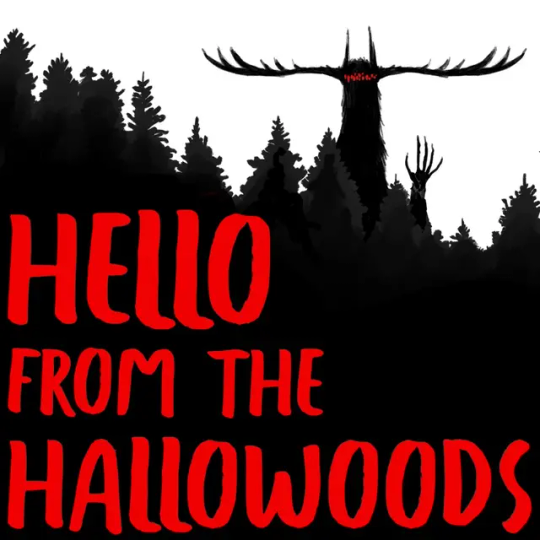
Come walk between the black pines! In this award-winning queer fiction podcast, an eldritch narrator follows the increasingly connected residents of the forest at the end of the world. It's a bittersweet story that explores queer identity, horror genre tropes, and finding hope in humanity's last moments.
Hello From The Hallowoods is my absolute favorite podcast! If you only listen to one podcast from this list, please make it this one - it's so beautifully written and super queer! Also: season 4 starts today!
Trans main characters include:
our nonbinary eye-affiliated podcast host
a nonbinary "Frankenstein's creature"
a transmasc ghost
a genderfluid storm witch
a trans woman who can visit other people's dreams
multiple characters using neopronouns
Camp Here & There:
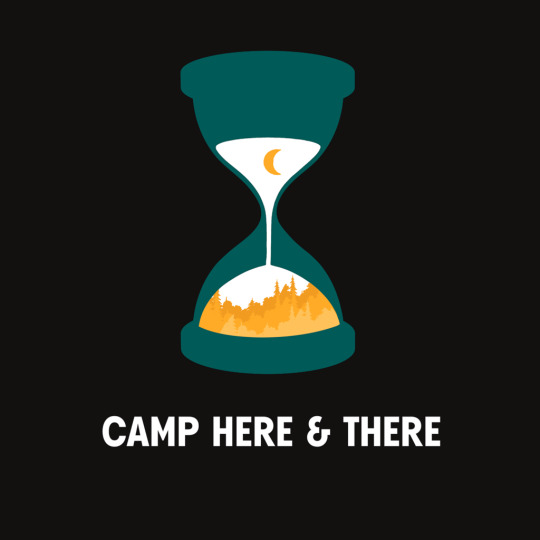
Good morning, campers! Camp Here & There is a weekly horror comedy podcast tuned in to the loudspeakers of a small midwestern sleepaway camp plagued by supernatural terrors and natural disasters. Sydney Sargent, resident camp nurse, cheerfully reports on all the terror we must face with a big smile. Let’s hope there’s nothing weird about that!
Sydney is a trans man.
Dos: After You:
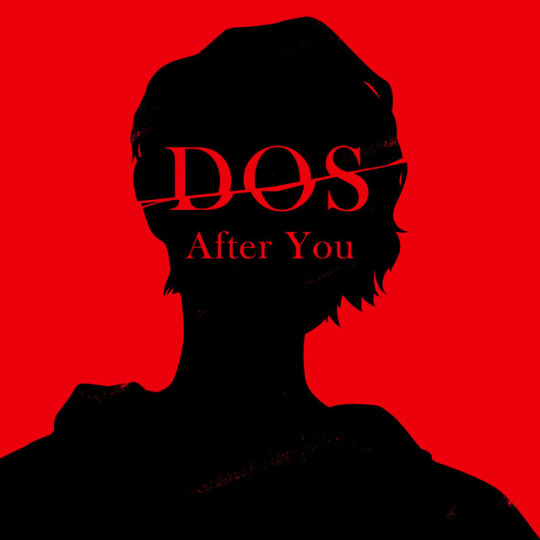
Things have changed. Deck has fallen in love with someone who isn't human, and leaves a hungry house behind to see him again. Will he be waiting for you? The world has changed… but what about him? Dos: After You is a queer urban fantasy/horror audiodrama available in both English & Spanish
Deck is a trans man.
Jar of Rebuke:
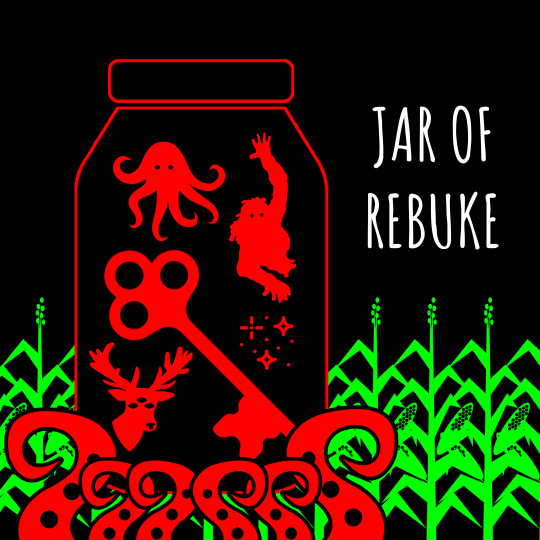
Follow Dr. Jared Hel's journey as he works to re-discover his forgotten past and finds his place within the small Indiana farm town of Wichton and the cryptozoological organization he works for called 'The Enclosure'. These audio journals, and other recordings, dive deep into Midwestern US cryptids and folklore while also telling a mystery about identity, queerness, neurodivergence, and community.
Jared is nonbinary.
Spirit Box Radio:
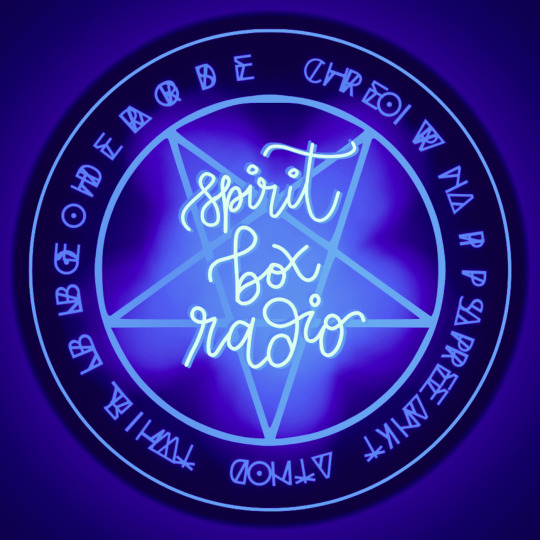
Spirit Box Radio is an award winning, horror audio drama podcast about a radio show for enthusiasts of all things arcane. Follow Sam Enfield a former postboy with no experience in the arcane arts, who finds themselves forced to take over running the show, following the disappearance of the previous host. Sam soon discovers there are more than ghosts haunting the show, and finds himself amidst a mystery which threatens everything he knows about the world beyond his tiny basement broadcast studio, and maybe even himself.
Sam is a trans man.
The Silt Verses:
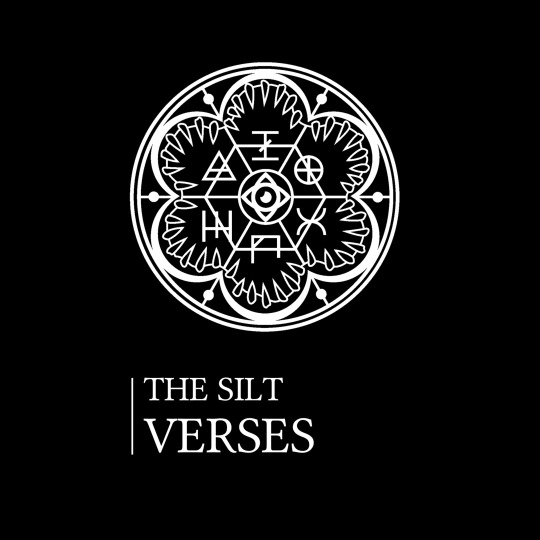
Carpenter and Faulkner, two worshippers of an outlawed god, travel up the length of their deity’s great black river, searching for holy revelations amongst the reeds and the wetlands. As their pilgrimage lengthens and the river’s mysteries deepen, the two acolytes find themselves under threat from a police manhunt, but also come into conflict with the weirder gods that have flourished in these forgotten rural territories. This is a world where divine intervention takes place through prayer-markings scratched into stumping-posts, and offerings are left squirming to die in the flats of the delta. This is a world of ritual, and hidden language, and sacrifice. This is folk horror, and fantasy, and a dark road trip into the depths of unusual faith.
Faulkner is a trans man and Paige is a trans woman.
The Magnus Protocol:

The Magnus Archives 2: The Magnus Protocol is the prequel/sequel/”sidequel” to the internationally renowned Magnus Archives podcast. The Magnus Institute was an organisation dedicated to academic research into the esoteric and the paranormal, based out of Manchester, England. It burned to the ground in 1999. There were no survivors. Now, almost 25 years later, Alice and Sam, a pair of low-level civil service workers at the underfunded Office of Incident Assessment and Response, have stumbled across its legacy. A legacy that will put them in grave danger. If this intrigues you then it is our pleasure to welcome you to the Office of Incident, Assessment and Response. Make sure you pick up your badge at desk and report to your line manager before sitting down. Oh and stay away from I.T., seriously.
Alice is a trans woman.
#hello from the hallowoods#hfth#camp here & there#camp here and there#chnt#dos: after you#jar of rebuke#the magnus protocol#tmagp#spirit box radio#the silt verses#tsv#nonbinary#genderfluid#transmasc#transfem#trans book of the day#trans books#queer books#bookblr#booklr#horror podcast#horror podcasts#queer horror podcast#queer horror podcasts#trans horror podcast#trans horror podcasts#trans horror#long post
855 notes
·
View notes